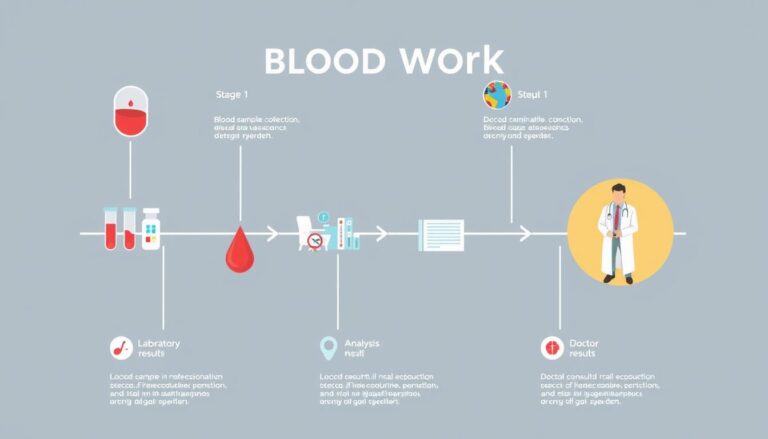When to Get Your Blood Work Done: Best Times and Seasons
When is the best time to get blood work done? This question is key to understanding our health. Blood test result time can affect the results.. We must consider the type of test, our age, and health to make smart choices.
Knowing when to get blood work is vital for our health. The right timing ensures accurate results. The frequency of blood tests varies by individual needs.

Exploring the best times and seasons for blood work is important. We’ll look at the impact of timing on our health. We’ll also discuss the best times for different tests, like how winter affects vitamin D levels.
Experience the freedom of unlimited diagnostics. Get Your NanoCard Now and take the first step toward hassle-free health.
For accurate and timely blood tests, visiting a trusted diagnostic centre in Yelahanka ensures reliable results and better health insights.
Understanding the Importance of Blood Work Timing
Blood work timing is key for getting accurate test results. The time you take your blood test can change the outcome. It’s important to schedule it right to get reliable results. Different blood tests need different times for testing.
Some tests need you to fast beforehand, while others don’t. Knowing how timing impacts your test results helps you prepare. It ensures you get the most accurate results possible. The right time and how often you need blood tests are also important.
How Timing Affects Blood Test Results
The best time for blood work varies by test type. For example, a complete blood count (CBC) can be done anytime. But, a blood glucose test needs you to fast first.
Why Proper Scheduling Matters
Getting your blood test at the right time is crucial. The timing and how often you get tested can affect the results. Always follow your doctor’s advice on when to take your blood test.
Common Blood Test Types and Their Timing Requirements
Here are some common blood tests:
- Complete Blood Count (CBC)
- Basic Metabolic Panel (BMP)
- Blood enzyme tests
- Blood tests for heart disease
Each test has its own timing needs. It’s vital to know these to get accurate results.
Best Time of Day to Get Blood Work
Getting blood work done at the right time is important. The morning is usually best, after fasting for at least 8 hours. This ensures accurate results for many tests.
The best time for blood work is between 7-10 am. This is when blood glucose and cholesterol levels are most accurate. Some tests, like the random blood glucose test, don’t need fasting. But for most, fasting is key for precise results.
Here are some key things to keep in mind when getting blood work done:
- Fasting is typically required for 8-12 hours before a blood test
- Drinking water before a blood test is generally allowed and can help hydrate your veins
- Strenuous exercise before a blood draw can impact the accuracy of cholesterol and glucose tests
- Alcohol consumption the night before a blood test may affect certain results
Understanding the best time for blood tests and preparing properly ensures accurate results. Whether it’s a routine checkup or monitoring a health condition, knowing when to get blood work done is crucial.
| Blood Test | Fasting Required | Best Time of Day |
|---|---|---|
| Blood Glucose Test | Yes | Morning |
| Lipid Profile | Yes | Morning |
| A1c Test | No | Anytime |
Optimal Seasons for Different Types of Blood Tests
Choosing the right time for blood tests is key to getting accurate results. The best time can change based on the test type and personal needs. For example, winter is great for checking vitamin D levels and spotting seasonal allergies.
It’s important to know how blood components change with the seasons. In winter, vitamin D levels often drop because of less sunlight. Blood tests can help track these levels. Also, cold weather can make anemia symptoms worse, so it’s good to check hemoglobin and iron levels.
Summer vs Winter Blood Work Considerations
Summer might be better for blood tests to check cholesterol and spot heat-related illnesses. The weather can affect test results. For example, dry indoor air in winter can lead to dehydration, which blood tests can detect.
Seasonal Variations in Blood Components
When planning blood tests, consider a few things:
- Vitamin D levels, which may be lower in winter
- Hemoglobin and iron levels, which can be affected by cold weather
- Cholesterol levels, which may be more relevant in summer
- White blood cell counts, which can assess immune system strength during flu season
Weather Impact on Test Results
Regular blood tests help manage chronic conditions like diabetes and heart disease, which can get worse in winter. By picking the best seasons for blood tests and understanding how blood components change, we can get accurate results and keep our health in check.
| Season | Blood Test | Reason |
|---|---|---|
| Winter | Vitamin D test | Monitor vitamin D levels due to reduced sunlight exposure |
| Summer | Cholesterol test | Monitor cholesterol levels and detect heat-related illnesses |
| Winter | Hemoglobin and iron test | Check hemoglobin and iron levels due to cold weather |
When to Get Blood Work Based on Age and Health Status
The need for blood work changes with age and health. People over 50 might need it more often to check their health. Those under 30 might only need it every 2-3 years. Knowing how age and health affect blood work helps us prepare and get accurate results.
When thinking about when to get blood work, our health matters a lot. If we have a family history of diabetes or heart disease, our doctor might suggest more frequent blood work frequency. Our age also plays a big role in optimal blood work timing. As we get older, our risk for health problems grows, making regular blood work key for early detection.
Here are some general guidelines for blood work frequency based on age:
- Women in their 20s and 30s: blood pressure screening once a year
- Women in their 40s: mammogram and full-body skin exams annually
- Men in their 40s: cholesterol check and full-body skin exams each year
- Individuals in their 50s: cholesterol check once a year, and women should also undergo bone density tests every 5 years
It’s important to talk to our doctor about the best blood work frequency and optimal blood work timing for us. This way, we can keep our health in check and catch any problems early.
Preparing for Your Blood Test: Timeline and Requirements
Getting ready for a blood test is key to getting accurate results. The time needed and what you need to do can change based on the test and your situation. Knowing about fasting, medications, and lifestyle changes before the test helps prepare you.
Some tests need you to fast for 9-12 hours before. Tests like liver function, cholesterol, and blood glucose tests usually require fasting. Drinking lots of water before the test can help because it keeps your veins full.
Here are some important things to remember when getting ready for a blood test:
- Fasting requirements: Some tests need you to fast for 9-12 hours before.
- Medication considerations: Some medicines might need to be skipped before the test.
- Lifestyle adjustments: You might need to avoid certain foods or drinks, like cooked meats or herbal tea.
Following the blood test requirements and timeline is crucial for accurate results. Knowing what to do before a blood test helps you prepare and makes the process smoother.
By following the guidelines for preparing for a blood test, you can help ensure accurate results. Understanding the timeline and fasting rules is important. Being prepared is essential for a successful blood test.
| Test Type | Fasting Requirements | Medication Considerations |
|---|---|---|
| Liver Function Test | 9-12 hours | Avoid certain medications |
| Cholesterol Test | 9-12 hours | Avoid certain foods and drinks |
| Blood Glucose Test | 9-12 hours | Avoid certain medications and foods |
Special Circumstances That Affect Blood Work Timing
When we think about when to get blood work done, we often consider our health and age. But, there are other special situations that can change when the best time is. These include being pregnant, sick, or hurt. Knowing how these situations can change blood test timing is key to getting ready and getting accurate results.
For example, pregnant people might need more blood tests to check on their health and their baby’s. People who are sick or hurt might need to wait until they feel better to get a blood test. It’s important to think about these special situations when figuring out the best time for a blood test.
Here are some special situations that can change blood test timing:
- Pregnancy: Blood tests are key during pregnancy to watch over the health of the mother and baby.
- Illness: Some illnesses might need more blood tests to keep an eye on the person’s health.
- Injury: Injuries might need blood tests to see how bad they are and to track recovery.
Talking to a healthcare provider is crucial to find the best time for blood work. They can guide you on the best timing and help make sure the results are accurate.
Conclusion: Making the Most of Your Blood Work Schedule
Getting your blood work done at the right time is crucial. It ensures your test results are accurate and reliable. By following the guidelines in this article, we can tailor our blood work schedule to our needs and health.
It’s important to know the best time of day and season for blood tests. Also, understanding what preparation is needed for accurate results is key. Staying informed helps us make the most of our blood work schedule.
By doing so, we can monitor our health closely and catch any issues early. Remember, your health is your most valuable asset. By staying on top of your blood work and working with your healthcare provider, you can make informed decisions. This helps you maintain optimal well-being. Here’s to a healthier you, now and in the future!







